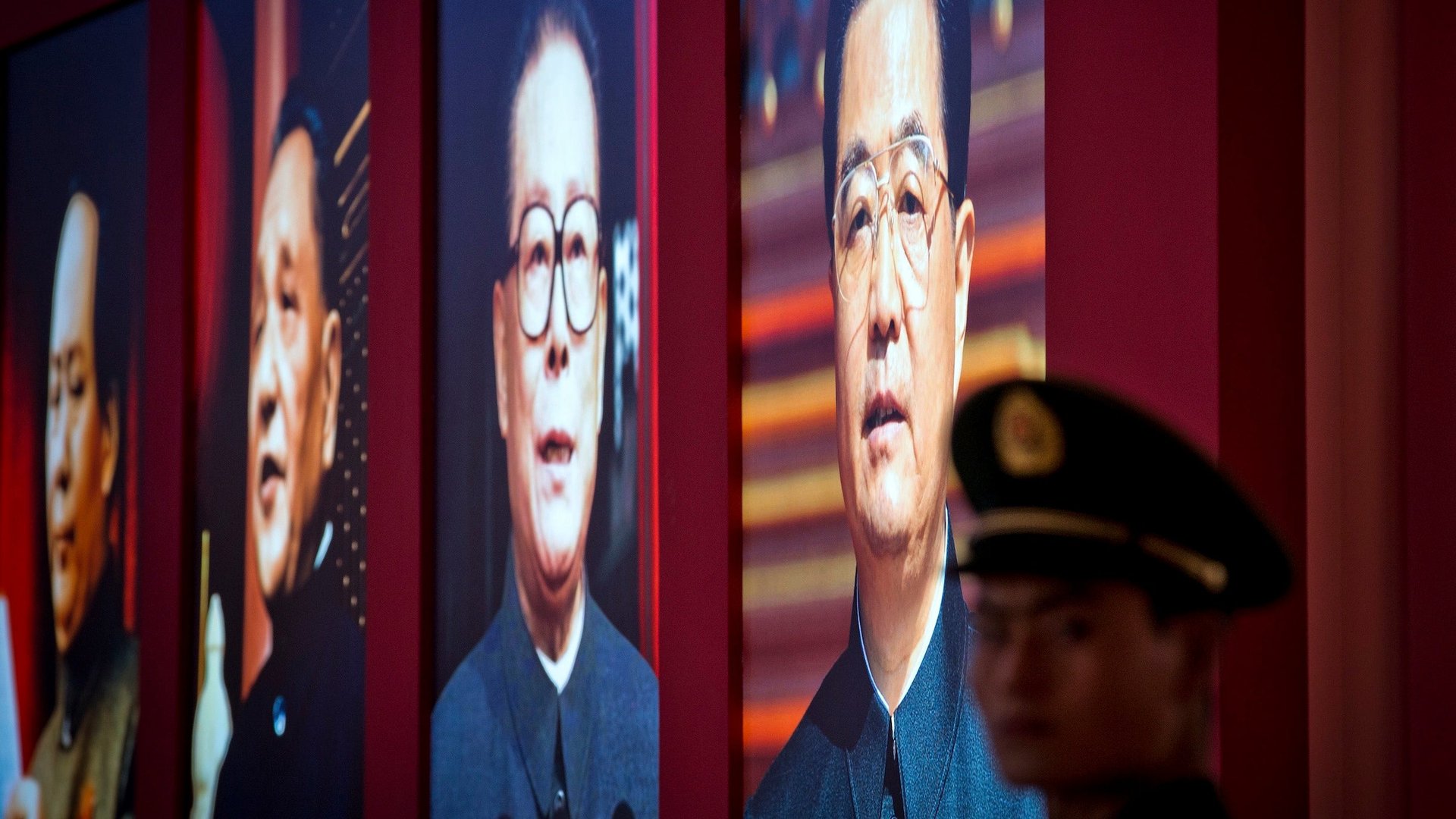Seven men, 18 reforms, zero ping-pong balls and one moat: China’s leadership change in numbers
Now that the US has wrapped up its election, the world turns to the world’s second largest economy, China, which begins its own leadership change this week. If you are already overwhelmed by the deluge of coverage, here’s a quick breakdown.


Now that the US has wrapped up its election, the world turns to the world’s second largest economy, China, which begins its own leadership change this week. If you are already overwhelmed by the deluge of coverage, here’s a quick breakdown.
2,270 delegates…
…will meet at for the Chinese Communist Party’s (CCP) 18th party congress, which starts Nov. 8 in Beijing. Started in 1921, the congresses are held every five years mostly to rubberstamp the country’s five-year plans. Every other congress, a new set of top leaders to the party and civilian government is announced. Xi Jinping is expected to be the new party general secretary as well as president, a less important post. He will not be formally appointed until March.
Five generations of leaders…
…including the incoming one have led the communist republic since its founding. The first transfer of power in 1976 took place at the end of Mao Zedong’s Cultural Revolution; the second just after the violent crackdown on protests at Tiananmen Square in 1989. In that time the dominant leadership of men like Mao and Deng Xiaoping has devolved into a consensus-based decision-making, and the CCP has tried to make the leadership transitions as predictable and stable as possible to compensate for the lack of strong leadership. Power is currently distributed among three informal factions: the “populists”, the “elites”, and the People’s Liberation Army. The new crop of leaders will be the first to have lived their entire lives under communism.
Seven men…
…are likely to serve on the Politburo Standing Committee (PSC), according to reports. The PSC is the country’s highest decision-making body. Its members are chosen secretly and through negotiations between present and past party leaders trying to hold onto influence. The PSC currently has nine members. A number of conflicting reports have emerged on the new committee’s expected makeup, but the consensus is that it will be led by current vice-president Xi Jinping, will be only seven strong, and will almost certainly be all-male. Key to watch will be whether it includes two known liberal reformers: Wang Yang, party secretary of Guangdong who made “happiness” part of his province’s five year plan, and Li Yuanchao, a former reporter and head of the party’s organization department. If not, expect a more hardline leadership, which favors economic but not so much political reform.
1,704 foreign journalists…
…are registered to cover the congress, according to Xinhua’s Twitter account. Richard McGregor observes in his book, The Party, that foreign journalists have focused almost entirely on China’s economic growth rather than the opaque internal politics of its communist party. As the country has opened its economy, the CCP has strategically retreated from public view, fooling many into believing it is no longer relevant. That includes media mogul Rupert Murdoch, who commented on a trip to China in the 1990s: “I’m yet to meet a communist.”
1.4 million residents…
…have reportedly been recruited to beef up security in the capital. Chinese bloggers have complained about having to register in travel logs when taking a cab, and taxi drivers have been warned to look out for passengers carrying ping-pong balls, which activists used in the past to carry subversive messages. Taxis have also been ordered to lock their doors and windows during the congress so passengers can’t toss said subversive ping-pong balls and other messages onto the road. This week, China’s top security official made a public display of checking a moat on the outskirts of Beijing as a security measure.
97 and 22…
…are the ages of the oldest and youngest delegates who will be at the congress—Jiao Ruoyu, the former mayor of Beijing, and Jiao Liuyang, an Olympic gold medalist. The Chinese government says the party has over 80 million members, as of the end of 2011. While that number has been disputed, the CCP is still home to a diverse and remarkable number of party faithful as well as citizens using the group for professional connections.
18 economic reforms…
…China should implement over the next five years, as laid out by Caixin, a Chinese business magazine headed by the outspoken editor Hu Shuli. Proposals include breaking up the monopoly of state-owned enterprises—cited by some as the reason economic reform in China has been stifled—and allowing private capital into the Chinese banking system, which is dominated by state-owned banks. Another proposal calls for social welfare reform to fill a shortfall in pension funds that by 2013 will reach ¥18.3 trillion, according to a report by China Bank and Deutsche Bank.
Up to 5,000 jobs…
…in the CCP and government could change hands during this leadership transition, says Orville Schell, director of the Center on US-China relations at the Asia Society in New York. That figure includes heads of ministries, governors, provincial party secretaries and local level government positions. “It’s a mad scramble that’s all controlled by the Organization Department,” he added. “This is like a big tidal flush coming in… So obviously a lot of people are anxious.” Still, considering China’s size and the fact that the administration lasts for ten years, perhaps it’s not that bad. Each incoming American administration has 3,000-4,000 political appointees, of whom 1,000 must be approved by Congress.